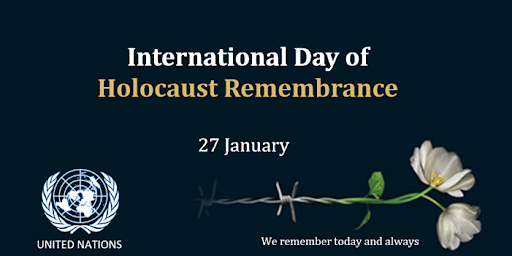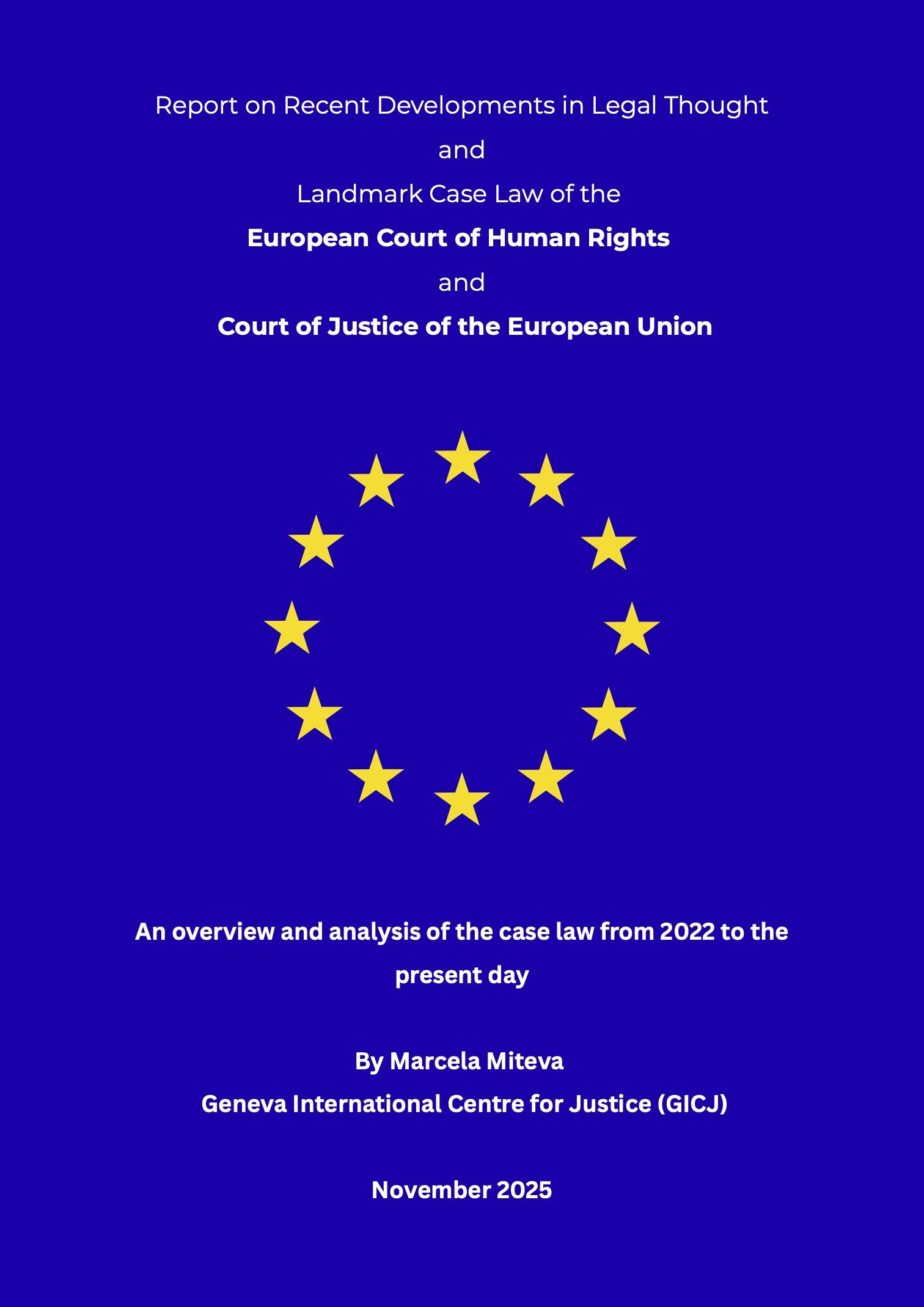
By Khoa Doan / GICJ
The 27th of January 2023 marks the 18th International Day of Commemoration in Memory of the Victims of the Holocaust or the International Holocaust Remembrance Day. The United Nations General Assembly established this annual International Day in November 2005 through General Assembly Resolution 60/7.
Polish lawyer Raphäel Lemkin first came up with the concept of “genocide” in 1944 via his book ‘Axis Rule in Occupied Europe’. It refers to the Greek prefix genos, meaning race or tribe, and the Latin suffix cide, meaning killing. He developed the concept in response to the Nazi systemic murder policies against Jewish people during the Holocaust. Genocide was recognized as a crime under international law in 1946 by the United Nations General Assembly (A/RES/96-I). It was mentioned as an independent crime in the 1948 Convention on the Prevention and Punishment of the Crime of Genocide (the Genocide Convention). In accordance with Article 2 of the Genocide Convention, genocide means “any of the following acts committed with intent to destroy, in whole or in part, a national, ethnical, racial or religious group, as such: Killing members of the group; Causing serious bodily or mental harm to members of the group; Deliberately inflicting on the group conditions of life calculated to bring about its physical destruction in whole or in part; Imposing measures intended to prevent births within the group; Forcibly transferring children of the group to another group”.
Background
As a result of Germany's 1938 occupation of Austria and part of Czechoslovakia, memorial towers were built on top of hills in memory of the country's soldiers killed duringthe war. The loss of life of Jewish people during the Second World War, although statistics vary, often ran into the hundreds of thousands in the Allied countries of Europe, especially three million Jewish in Poland and one million in the Soviet Union. At the outbreak of the war and throughout its course, there have always been people who ignored events leading up to the war or were indifferent believing that it “probably have nothing to do with us”. Hannah Arendt, a Jew who survived those dark years, wrote a book called “The Banality of Evil”. In her book, the author discussed the highest level of indifference: when people are complicit in evil and do not see their contribution to the death of six million Jewish people.
Pastor Martin Niemöller's statement about WWII is as follows:
First they came for the socialists, and I did not speak out—because I was not a socialist.
Then they came for the trade unionists, and I did not speak out—because I was not a trade unionist.
Then they came for the Jews, and I did not speak out—because I was not a Jew.
Then they came for me—and there was no one left to speak for me.
On the 1st of November 2005, the United Nations General Assembly passed Resolution 60/7 to designate the 27th January as the International Day of Commemoration and urge every member state to honour the memory of the victims of the Holocaust. Israel proposed the resolution in order to encourage other states to develop education programs for future generations to be informed about Holocaust crimes, with the goal of preventing future genocides. The resolution also raises awareness of all manifestations of religious intolerance, incitement, harassment or violence against persons or communities based on ethnic origin or religious belief. It calls for the preservation of Holocaust death camps, concentration camps, forced labour camps and prisons, for the purpose of remembrance and education.
Theme of International Holocaust Remembrance Day 2023: “Home and Belonging”
The theme of this year's International Day reflects the humanity of Holocaust victims and survivors whose homes and senses of belonging were ripped away by the perpetrators under the regime. There were two major factors responsible for systemic injustice and discrimination that led to genocidal killings, which were characterised by disinformation and hate speech. The day reminds us about our responsibility to remember the victims of atrocity crimes, and to counter hate speech, antisemitism, Holocaust distortion and denial, and prejudice – to do all we can to prevent genocide.
Current Global Issues
Russian Invasion and Bucha Massacre in Ukraine
News about the massacre of Russian soldiers against Ukrainian people in Bucha, a small town located 25 km northwest of Kyiv, has appeared densely in news outlets in recent days. After the Russian army withdrew and the Ukrainian army returned to take over the area north of Kyiv, mass graves and dead bodies of civilians were scattered around every corner of the city, shocking Ukrainian officials and the international observers and reporters accompanying them.
According to official allegations from Ukraine, the corpses show many civilians with their hands tied behind their backs, being shot from close range and even showing signs of torture. On the 4th of April 2022, the bodies of 410 civilians killed in these ways were found. The Ukrainian authorities insist that this is clear evidence of war crimes committed by Russia.
Ukrainian President Volodymyr Zelenskyy affirmed that his government would propose a special justice mechanism to investigate all war crimes committed by the Russian military on Ukrainian soil.
As long as the mechanism can be coordinated with international institutions that have closely followed the situation in Ukraine in recent years, such as the International Court of Justice (ICJ), the International Criminal Court (ICC), and the United Nations High Commissioner for Human Rights (OHCHR), it will create objectivity, legitimacy, and the right international pressure on Russia.
Inn Din Massacre in Myanmar
The Inn Din killing is the mass massacre of the Rohingya by the Myanmar army and Rakhine armed locals in Inn Din village, Rakhine state, Myanmar on September the 2nd 2017. The victims were members of the Arakan Rohingya Salvation Army (ARSA). This is the first case where Myanmar's security forces have admitted to killing people, rather than being prosecuted, in their “cleanup operations'' in the region.
On the 1st of September 2017, many of the villagers who had been hiding in the mountains began descending the beaches of Inn Din in search of food. Armed soldiers and paramilitary members arrived and detained ten men on the beach, who are accused of being members of ARSA. According to local Rakhine eyewitnesses, the people were transported to the village school around 5 p.m., photographed, dressed, and fed their last meal. The next morning, the military took another picture of the men kneeling on the ground. They were then taken up a hill and shot in the head by soldiers. Some of the victims survived and made noises while buried alive, prompting a local paramilitary group to slash them to death with machetes.
The US invasion and occupation of Iraq
In 2003 the US and its allies lunch a war of aggression against Iraq, and invaded its territory, then occupied the country for more than a decade. As a military invasion waged without justification the war on Iraq was a war of aggression, which according to the Tribunal of Nuremberg is not only an international crime, it is the supreme international crime that contains within itself the accumulated evil of the whole. An act of aggression is further recognized as an international crime in the Rome Statute of the International Criminal Court. Since it had an enormous impact on the lives of millions of Iraqis and ultimately brought the country to the absolute chaos it is witnessing today, GICJ believes that this is tantamount to genocide.
Today, the population of Iraq is still paying a high price for the brutal invasion and occupation: besides the almost 3 million of Iraqis who died during and after the war, millions currently live under the poverty line and the number of orphans who live in the streets has exponentially increased. The invasion has also caused huge amounts of internal and external displacement, making Iraq one of the top 3 migratory countries. IDPs often live in extreme poverty and are unable to satisfy even their most basic needs.
Challenges Ahead
Geneva International Centre for Justice (GICJ) expresses concern that genocide is still widespread around the world. Although the International Court of Justice (ICJ) emphasised that the Genocide Convention is part of general customary international law. This means that whether or not States have ratified the Convention, they are all bound as a matter of law by the principle that genocide is a crime prohibited under international law. The ICJ has also stated that the prohibition of genocide is a peremptory norm of international law (or ius cogens) and consequently, no derogation from it is allowed. However, mechanisms like the ICJ can, ultimately, only be effective if they are actively used and their decisions respected by other states.
On this year’s International Holocaust Remembrance Day, let the world remember that “commit to never be indifferent to the suffering of others, and never forget what happened or let it be forgotten by others. Let us pledge to always be vigilant and uphold human rights and dignity for all” – UN General Secretary António Guterres.
International Holocaust Remembrance Day, human rights, justice, crime against humanity, Genocide Convention, massacre, Home and Belonging, geneva4justice, GICJ, Geneva international centre for justice
InternationalHolocaustRemembranceDay Humanrights justice Crime_against_humanity GenocideConvention Massacre HomeandBelonging Geneva4Justice GICJ GenevaInternationalCentreforJustice Justice RuleofLaw









